So you’re looking for the best solar panels for RV battery charging? That makes a lot of sense, since the solar kit can conveniently power numerous appliances in your recreational vehicle. This power is quiet, clean, and quite friendly for the environment. If you’re parking your RV under the hot sun, you may as well take advantage of the free energy.
However, not all solar kits are the same. Some are better than others, though this may depend on your RV, your needs, and your budget. But at least with this guide, you can get a clearer idea of how to find the RV solar panel for RV battery charging that best suits your needs.Product | Name | Editor's Rating | Check Prices |
|---|---|---|---|
Renogy Monocrystalline | 5 out of 5 | ||
WindyNation | 5 out of 5 | ||
ECO-WORTHY | 4.5 out of 5 | ||
HQST Polycrystalline | 4.5 out of 5 | ||
HQST 50 Watt | 4 out of 5 |
Factors to Consider
So what should you consider when you’re buying a solar panel kit?
- The brand. The brand reputation is crucial, as you want a brand that you can rely on.
- Customer reviews. While expert reviews can be helpful, RV solar panels reviews from actual customers can reveal any potential problems you may encounter down the road.
- Customer support. You’ll probably have lots of questions, so the customer support people should be helpful. If you have a repair problem, they should also be able to offer solutions.
As for the specific factors you need to consider, read on as that info is in another section.
Best RV Solar Kit
Here are some solar kits that you should consider:
1. Renogy 100W Solar Power Starter Kit
This is designed for newbies who wish to add solar power to their RV. It comes with a mono-crystalline 100W solar panel.
- It can offer up to 500 watt-hours per day.
- It can full charge a 50Ah battery at half charge in just 3 hours.
- It’s very simple and easy to install.
- You can add another panel and you can replace the controller with a better one.
2. Windy Nation 100 Watt Complete Solar Charging Kit
This has everything you need except for the battery, and there’s a kit option that also includes an AGM battery.
- This will offer about 350 watt-hours of charge per day.
- You can add more solar panels.
- The controller that comes with the kit can handle 4 similar panels (12 volt system) or 8 panels (24 volt system).
- The controller has adjustable settings.
3. Eco-Worthy 20W 12V Poly Solar Panel Kit
This is a budget solar panel system that can power an appliance or two, such as a laptop or a smartphone.
- It’s very affordable.
- It’s easy to carry for camping.
- It can withstand high winds and snow, and it is waterproof.
- It can last for a very long time, as the aluminum frame can last for more than 20 years.
4. HQST 100W Polycrystalline Solar Suitcase
This is called a plug and play system, and it uses polycrystalline panels with sturdy aluminum stands.
- It’s extremely easy to install.
- It comes with a traveling bag.
- It weighs just 22 pounds.
- The controller has a battery charge percentage readout.
- It will charge your RV battery fairly quickly.
5. HQST 100 Watt 12 Volt Mono-Crystalline Solar Panel
This is the most efficient among the HQST solar panels, and this explains why it’s also one of the best solar panels for RV battery charging.
- It has a long service life.
- It can withstand snow loads and high winds.
- It has predrilled holes for easier installation.
- The aluminum frame is resistant to corrosion.
- It can with various types of inverters.
6. Renogy 50 Watt 12 Volt Mono-Crystalline Solar Bundle Kit
The kit includes a 50w Mono-crystalline solar panel, a 10A PWM charge controller, and a 9in 12AWG MC4 Adaptor Kit. It’s meant for those new to solar energy.
- The solar panel is extremely efficient, rated with 18.4% efficiency.
- The aluminum frame can last decades outdoors, as it is resistant to corrosion.
- The junction box can withstand the elements, and can even withstand low-pressure water jets.
- It can be mounted quickly and securely with its pre-drilled holes.
7. ALLPOWERS Solar Panel 100W
This is semi-flexible and super-efficient as well. It is meant to charge 12V lead-acid and lithium-ion batteries.
- It can bend up to 30 degrees for installation.
- The efficiency is rated at 23.5%.
- The solar panel is water-resistant.
- The junction box is fully sealed and waterproof.
- You get 100W of power.
- The solar panel only weighs about 5 pounds.
How to Choose the best solar panels for rv and Kits?
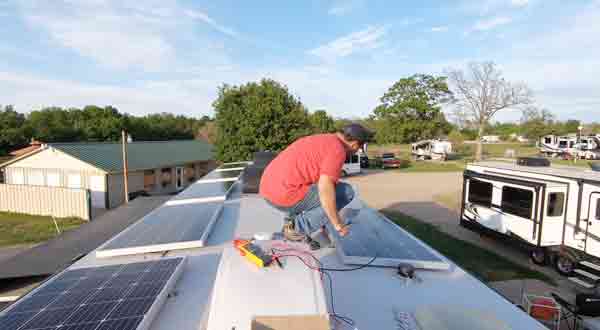
These are factors you need to consider when you’re buying the best solar panels for rv battery charging.
1. Quality and Efficiency
Efficiency refers to how well the solar panel takes in power from sunlight. Generally, the cheapest solar panels are also the most inefficient, so that they barely get enough power when the sun isn’t shining all that bright.
But other solar panels are much more efficient, but there more expensive.
2. Electrical Output
The electrical output of your solar panels must be greater than your electrical power needs.
3. Amount of Power Needed
You have to have enough power to run all your appliances. The more appliances you have, the more power you need. That’s especially true if you plan to power appliances that use up a lot of power, like a fridge or even an air conditioner.
4. Expandability
This is its ability to expand if your power needs grow. You have to know if you can easily add more solar panels to your kit to power your appliances.
5. Weight and Design
If you have a highly efficient solar panel system, it will probably be bigger and heavier. So you need to know of your RV can accommodate the weight and design. This can be rather problematic if you have a bulky and heavy solar panel and you’re driving for miles on a cross country summer trip.
A small and lightweight solar panel will be better for your gas mileage, but then this will probably be more inefficient. You have to pick your poison, and figure out which disadvantage you can live with.
6. Solar Panel Wattage Cells
Wattage refers to the current output of the solar panels. The higher the wattage is, the more electrical appliances you can power. You can determine the current output per solar panel cell, and then your total overall current output with the number of solar panels you have.
7. Geographical Location
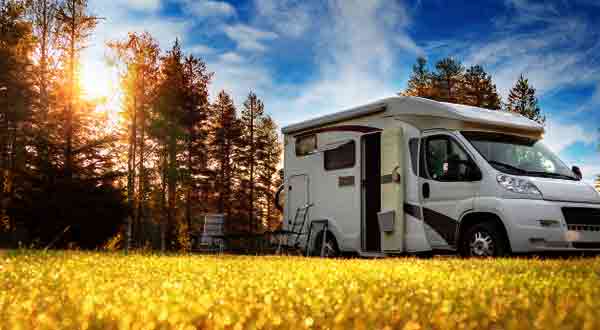
More efficient solar panels are very necessary for locations with poor sunlight conditions. In general, the farther you go north of the equator, the more efficient your solar panels will have to be.
8. Portability
If they’re portable solar panels for rv battery charging, they are easier to bring to your RV. They’re also usually easier to install.
9. Durability
Since these are placed outdoors, you need solar kits that can withstand the environment reasonably well. So you need something that can last for a long while, since you don’t want to waste your money constantly buying best rv solar panels that break down easily.
10. Ease of Installation
While you can have a pro install the solar panel kit for you, there may be instances when you will have to take down the solar panel, and then you’d have to install it back again yourself. So this means that you really need to know how to install the solar panels, and it helps if it’s easy even for newbies.
11. Price
You need to check to see if you can afford the solar panel kit, and if it gives you good value for your money.
12. Pros and Cons of RV Solar Kits
Solar panel kits do come with their own sets of benefits and disadvantages. It’s up to you to decide whether the pros outweigh the cons.
Pros
- The power source is free. You don’t have to buy gasoline or charge an electric battery which can raise your home electricity bill. If the sunlight is strong in your location, then you can get a lot of free energy.
- The whole system operates quietly. Lots of generators can be quite noisy, and they can bother the serenity of a night outdoors when you and your family are trying to relax. This system doesn’t make noise at all.
- You don’t end up with fumes. Carbon emissions are the main problem with gasoline-powered generators. You may need up breathing in fumes, and that’s unhealthy. You also do damage to the environment.
- The solar panels also require very little maintenance.
Cons
- It can be expensive.
- It doesn’t offer as much power output as some generators.
- Installing it can be difficult.
- Solar panels on your roof can make your vehicle less aerodynamic on the road. It can decrease your fuel mileage.
How a RV Solar Kit Works?
A solar kit is a type of energy kit that includes sonar panels. These panels capture the energy of the sunlight to power a battery, which then powers the rest of your electrical appliances.
Since we’re talking about RV solar kits, this means that these solar kits are meant to fit on the roof of a recreational vehicle.
Benefits of Investing in an RV Solar Panel
This isn’t really the most powerful energy source you can have, and it doesn’t compare to a gasoline-powered generator. However, it offers a lot of benefits.
You can power lots of lights and perhaps a radio with solar panels. It all depends on how efficient and how big your solar panels are. If you have high wattage and overall electrical output, you can power electric fans too.
Types of Solar Panel
Solar panels come in several types, and it’s best if you know the differences between each one.
1. Mono-Crystalline
At first glance, this looks like a wafer. This is a common type of solar panel, and it’s the better choice for those RVs which tend to park in generally low-light or partially shaded locations. It’s extremely efficient with a general efficiency rating of more than 16%.
On the other, its efficiency does come with a higher cost. That’s mainly because the production process is quite expensive due to a costlier purification process.
2. Poly-Crystalline
This is quite noticeable because it’s distinctly blue. Its appearance is rectangular and it doesn’t look like a wafer at all.
This is less efficient than the mono-crystalline, and the power output is less as well. But its efficiency is greater than other models except for the mono, as this can get up to 15% efficiency. It’s also less expensive than the mono.
3. Thin Film
This uses newer technology that gets you about 7% to 13% efficiency, at a much lower cost. You can also integrate this with other types of solar panels, in case you ever need to increase your overall power output and you have a mono or a poly-crystalline solar panel already installed.
4. Copper Indium Gallium Selenide (CIGS)
This gives you an efficiency of around the 10% to 12% range. It’s built with les amounts of cadmium, which is a toxic material that many solar panels require.
Types and Purpose of a Charge Controller
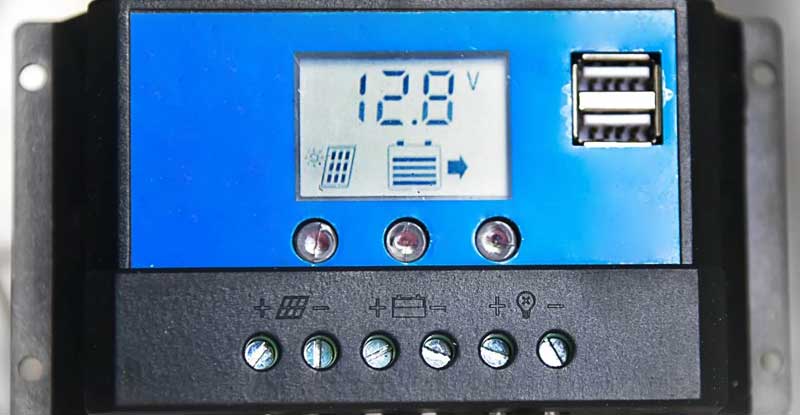
The controller’s purpose is to regulate the flow of electrify to the battery.
1. Single Phase
This has a single output and charge continuously at the same rate. Usually they charge at a high voltage. It charges quickly, but the battery doesn’t absorb the power efficiently.
2. Single Phase Trickle
It also has a single output, but it’s at a much lower voltage. This can take a very long time to charge a battery, but they can keep batteries topped off more efficiently.
3. Multi-Phase
This can quickly charge a battery, and then slow down to help the battery absorb the power more efficiently to top off. This is the best type of controller.
Types Of Batteries
The battery is what stores the energy from the panels, and then you hook up your appliances to the battery. There are different types.
1. Flood/Wet
These have lead plates flooded with battery acid. They offer greater peak amp draw, and they can withstand deeper discharging cycles.
However, they have greater maintenance requirements, and they’re also more vulnerable to corrosion.
2. Gel
These have a gel substance that store the electrolyte. They’re not liable to leak or spill. You have several mounting options, and they’re great fore areas with low ventilation.
On the other hand, they need special charger controllers and regulators. They’re not as good for rapid discharge. They’re also somewhat more expensive.
3. AGM
This means “absorbed gas mat” and it uses a special glass plate. It offers multiple mounting options, and it doesn’t spill at all. It works well for rapid discharge and it can be brought back to voltage quickly.
4. Lead-Acid Battery
This is an old type of battery, and you commonly find it in automobiles.
5. Lithium-Ion Battery
This is the battery that powers smartphones and other mobile devices. It can also be used for cordless power tools, and the more powerful ones can power electric vehicles.
Types of Inverters
Inverters can be typed according to the watts they offer. If you have a 1500-watt inverter, you can most likely power small appliances including a TV. But if you’re powering an air conditioner, you’re going to need at maybe a 3000-watt inverter.
How to Size Your RV Solar Panel System?
Conducting an Energy Audit can be a complicated exercise, though there are online guides that can help you do this yourself. But your best option is to get a pro to calculate your energy needs so that the appropriate type of solar panel kit can be installed to meet your power usage.
FAQs about RV Solar Panels
Here are some answers to frequently asked questions:
1. Flexible Solar Panels for your RV: What is the difference between flexible RV solar panels and rigid RV solar panels?
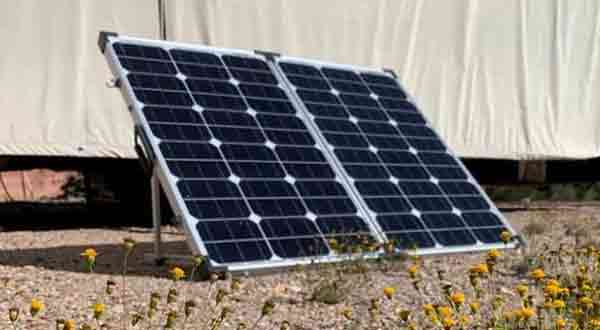
The flexible RV solar panels are also known as the thin film panels. It’s a very new type of solar panel.
Advantages
- They are extremely lightweight.
- You can install more of the, as they’re not all that heavy.
- They can be quite efficient.
- You can install them directly on your roof for a more streamlined look.
Disadvantages
- The warranty for this type isn’t as long as for the other solar panel types. You may get a warranty for 10 years, but others may give you a 30-year warranty.
- It can cause heat buildup in your RV. This can be a problem in the summer.
- You’ll have to glue this to the RV roof, so it’s not so easy removing them later. The glue may also damage the roof or the solar panels.
Rigid RV solar panels are hard and fixed, with an aluminum frame with glass panes.
Advantages
- This is obviously more durable. You can travel with this and this can weather harsh outdoor conditions.
- It’s highly resistant to heat.
- The installation cost is much lower.
- You can mount this panel tilted, so you can maintain the RV roof without stepping on your solar panels.
Disadvantages
- They’re much heavier.
- It’s more difficult to place them in between the other stuff on your roof.
- This doesn’t make your RV look good when they’re installed.
- Glass is still breakable.
2. How do I Calculate How Much Energy I Need?
Your appliances will have labels stating the watts and amps they use up. If they don’t, then just Google your appliance model to find this information.
Add the number of watts and amps you tend to use at the same time (for lights, fans, and the TV, for example) and then you have a good idea of how much energy you need.
This is, of course, an overly simplified way of stating this, as this topic can be very complicated with numerous math formulas.
3. Do I have to install a battery?
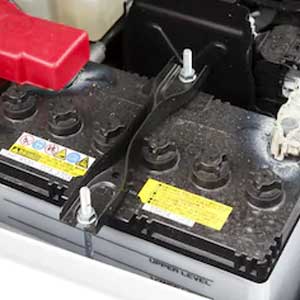
The short answer is yes. It’s true that it’s possible for you to hook up your electrical appliances directly to the solar panels. But solar panels do not provide a steady stream of power. It will fluctuate wildly, and so your appliances may sputter frequently.
But with a battery, you can get a reliable stream of electrical current while the battery absorbs the energy taken by the solar panels.
4. What Type of Panel is Most Efficient?
If cost is no object, then go for the mono-crystalline panels. They’re the most efficient with ratings generally over 16%.
5. Do I Require Additional Hardware?
That depends on the hardware already included in your kit. If you have a “complete” kit, then additional hardware won’t be necessary.
6. What Does a Typical Installation Include?
A standard kit tends to have:
- Solar panels
- A charge controller to control the power output of the panels
- A battery to contain the energy absorbed by the panels
Many kits also contain a power inverter so the DC battery current can power your AC current appliances.
7. Can I Run an Air Conditioner with Solar Power?
Yes, but with difficulty. Air conditioners are notorious for using up a large amount of power, so you need a solar kit that can provide that power. This kit will probably have to be rated to offer up to 3,000 watts.
8. How can I Increase the Autonomy Power of My Motor Home?
You do this with solar panels or generators. Motor home autonomy means freedom from conventional electrical power outlets you can find in many motor home parks. But if you wish to park your RV in a remote are, you better have enough electricity to power your appliances so you can eat and drink coffee, stay comfortable, and entertain yourself.
9. How to Determine an RV’s Solar Power Requirements
- List all your devices that use electricity.
- Note the watts used per item, and also note if they are AC or DC powered.
- Now multiply the watts of each appliance by the number of hours you expect to use it.
- Add the total number of watts.
- Check the appliances that need AC power, as they will need a converter to convert the DC power of your solar kit battery.
10. How Should I Install the Solar Panels on My Camper?
This will depend on the solar panel kit you buy. Each will come with specific instructions.
11. What Would be a Good RV Solar Panel with Good Wattage?
Buy a mono-crystalline panel with at least 140 watts. A panel with 200 watts is even better, as this will give you more power to run more appliances.
12. What size solar panel is required on a Caravan or Motorhome?
That depends on your appliances and how long you plan on being alone with access to standard electrical outlets or gas stations.
So let’s say you’re going out for a weekend in a remote location:
- If you have lots of appliances with a fridge, you need at least 180 watts with non-adjustable solution.
- For average consumers with no fridge, 110 watts can do.
- A small camper may work with 65 watts.
13. What’s the right wattage for caravans to run lights, TV etc.?
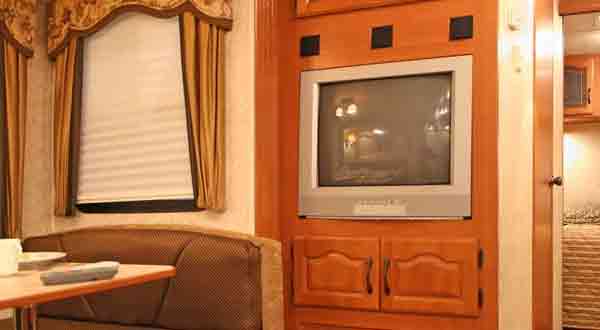
You’re probably best off with a 140-watt panel, as you can use lights and a TV with some more power to spare.
If you have a fridge, you should go with a pair of 125-watt panels. This is good enough for winter use as well.
But whatever best solar panels for rv use, the important matter is that you try to use them. With the best solar panels for RV battery charging, you power your appliances efficiently, without making any noise and without hurting the environment!
Leave a Reply